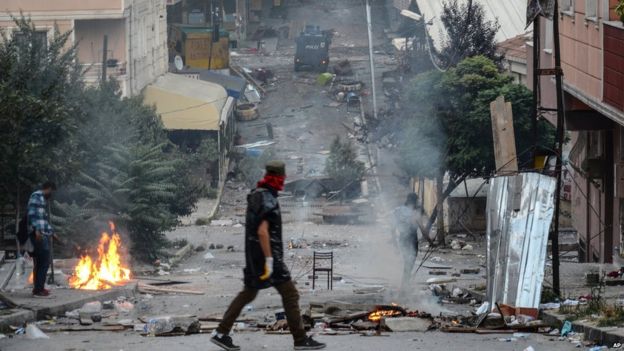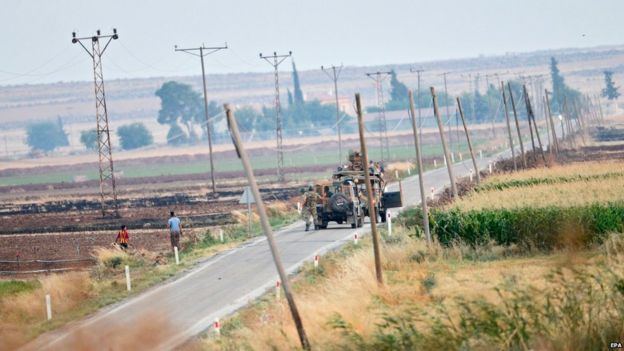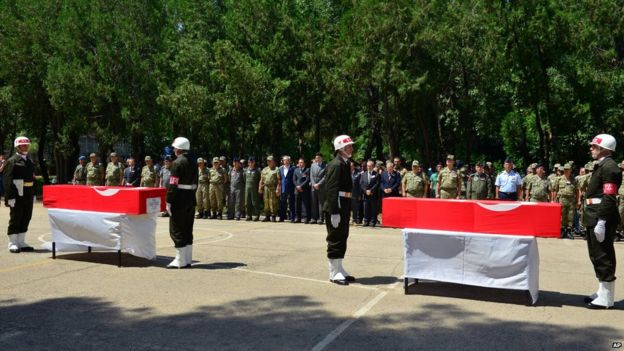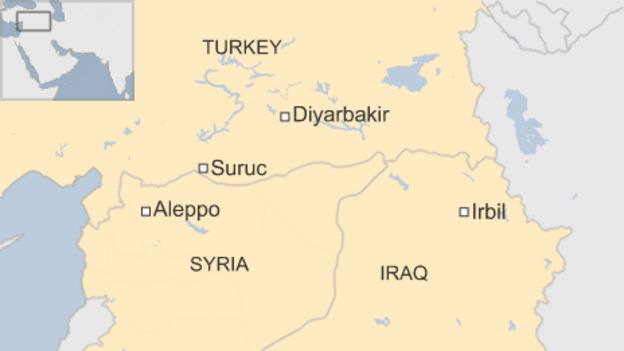
Kurdish forces in Syria have accused Turkey of repeatedly attacking their units across the border.
Turkey said it was investigating the claims but insisted the Syrian Kurdish units remained "outside the scope of the current military effort".
Turkey launched air raids on Islamic State fighters in Syria and positions of the Kurdish militant PKK in Iraq following violent attacks in Turkey.
Turkey has also said it has no plans to send ground troops into Syria.
The Kurdish People's Protection Units (YPG), the armed wing of the main Syrian Kurdish party (PYD), said that Turkish tanks had shelled the Kurdish-held village of Zormikhar inside Syria late on Sunday evening.

It added that, an hour later, one of its vehicles had come "under heavy fire from the Turkish military east of Kobane in the village of Til Findire".
In a statement on Monday, the YPG said: "Instead of targeting IS terrorists' occupied positions, Turkish forces attack our defenders' positions. This is not the right attitude.
"We urge Turkish leadership to halt this aggression and to follow international guidelines. We are telling the Turkish Army to stop shooting at our fighters and their positions."
A Turkish government official said its military operations sought "to neutralise imminent threats to Turkey's regional security" and was targeting IS in Syria and the Kurdish separatist PKK in Iraq.
"We are investigating claims that the Turkish military engaged positions held by forces other than [IS]," the official said.
"The PYD, along with others, remains outside the scope of the current military effort."

'Turmoil and instability'
Turkish Prime Minister Ahmet Davutoglu told a meeting of Turkish newspaper editors that, following Turkey's military action, there were now "new conditions" in the regional conflict.
"The presence of a Turkey that can use its force effectively can lead to consequences which can change the game in Syria, Iraq and the entire region; everyone should see that," the Hurriyet Daily News quoted him as saying.
The Washington Post meanwhile reports that Turkey and the United States have agreed to create a de facto safe zone along Syria's border with Turkey.
Such a deal would significantly increase the scope and pace of the US-led air war against IS in northern Syria, the paper says.

Nato is to hold an emergency meeting on Tuesday to discuss the situation.
Turkey - a Nato member - asked for the meeting based on Article 4 of the organisation's founding treaty, which allows members to request such a summit if their territorial integrity or security is threatened.
"When Turkey requests for such a meeting I think it's very right and very timely to have a meeting where we address the turmoil and the instability we see in Syria, Iraq and surrounding and close to Nato borders of Turkey," Nato Secretary General Jens Stoltenberg told the BBC.
Mr Davutoglu said Turkey was prepared to work with the PYD - which has links to the PKK (Kurdistan Workers' Party) - provided it did not pose a threat to Turkey and severed relations with Syrian President Bashar al-Assad.
However, the raids against the PKK in northern Iraq effectively ended a two-year ceasefire.

The week that changed Turkey
- Monday: Thirty-two people are killed by IS-linked militants in the Kurdish-majority town of Suruc, near the border with Syria
- Thursday: IS forces shoot dead a Turkish border guard
- Meanwhile, the PKK reportedly kills two Turkish police officers in retaliation for Suruc and what it sees as Turkey's collaboration with IS
- Friday: Hundreds of suspected IS supporters are arrested and properties are searched; Turkish F-16 jets bomb three IS targets in Syria
- Saturday: Turkey strikes IS and PKK targets in Syria and Iraq; the PKK says the conditions are no longer in place to observe a ceasefire
- Sunday: Car bomb attack on a military convoy in Lice in Diyarbakir provincekills two soldiers as strikes on targets in Iraq and Syria continue


Turkish police have continued to arrest suspected members of IS or the PKK, with further early morning raids on Monday.
In recent days, Turkey has arrested hundreds of people suspected of supporting the militants.
Police raids on suspected IS and PKK members in the city of Istanbul triggered three days of rioting in the Gazi district.
At least one activist and a policeman have been killed.

Kurdish acronyms:
- PKK: Kurdistan Workers' Party - Turkish Kurdish party led by Abdullah Ocalan (jailed since 1999)
- PYD: Democratic Unity Party - PKK-aligned party in Syria
- YPG: Popular Protection Units - PYD-aligned armed force in Syria
- KRG: Kurdistan Regional Government - the official governing body of the semi-autonomous Kurdistan Region of northern Iraq
- KDP: Kurdistan Democratic Party - the dominant Iraqi Kurdish party, led by Massoud Barzani
No comments:
Post a Comment
Comments...